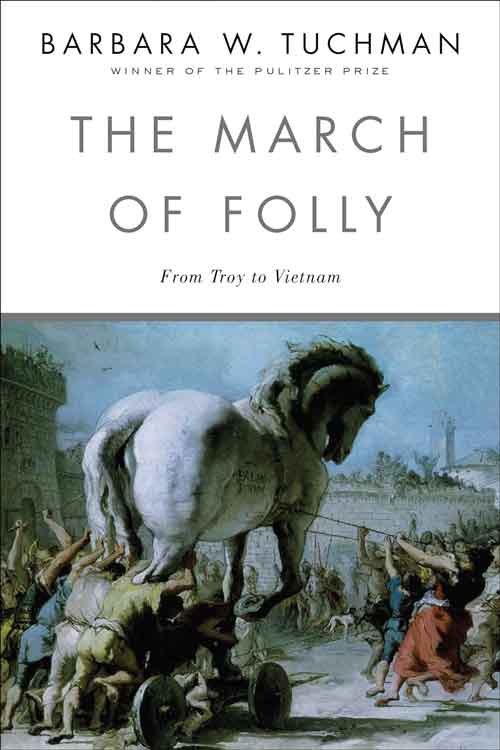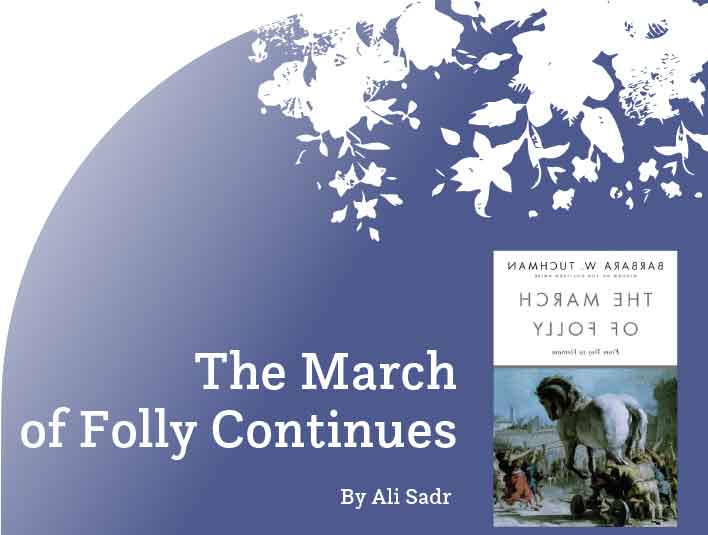The March of Folly Continues
Ali Sadr
 Published in 1985, the thought-provoking book, The March of Folly: From Troy to Vietnam, by American historian Barbara Tuchman, has remained on the best-seller non-fiction book lists for many years. This meticulously researched work examines historical events during which governments and leaders have made disastrous decisions against their own self-interest.
Published in 1985, the thought-provoking book, The March of Folly: From Troy to Vietnam, by American historian Barbara Tuchman, has remained on the best-seller non-fiction book lists for many years. This meticulously researched work examines historical events during which governments and leaders have made disastrous decisions against their own self-interest.
Tuchman, who won the Pulitzer Prize twice, provides insightful analysis and an engaging writing style that makes this book a must-read for those interested in understanding the recurring patterns of human folly. The book remains relevant because it is not limited to the past—we have been witnessing the same process with even more disastrous outcomes in our lifetime, which indicates that we never learn from our mistakes and are doomed to repeat them. Tuchman explores four case studies from different time periods: the Trojan War, the Renaissance popes, the British loss of the American colonies, and the United States’ involvement in the Vietnam War. However, in the long introduction, she tackles two more historical cases that are equally significant, if not more. One is the story of Montezuma (Aztecs) and Cortez (Spanish conquistador) and how an army of about 300 conquered an army of two hundred thousand, destroying a civilization. The second case is Japan’s attack on Pearl Harbor, which caused or facilitated the U.S. entering World War II and eventually led to the defeat of the Axis forces.
Through these examples, Tuchman presents a compelling argument that leaders often persist in pursuing policies that are clearly detrimental, despite ample evidence and warnings to the contrary.
Tuchman’s analysis of the Trojan War serves as a cautionary tale about the dangers of pride and stubbornness. She explores how Greek leaders, driven by their own egos, ignored the rational advice of their allies and pursued a decade-long war that ultimately led to their own downfall. This case study sets the stage for the subsequent chapters, where Tuchman examines similar patterns of folly in different historical contexts.
The section on the Renaissance delves into the corruption and mismanagement within the Catholic Church during the sixteenth century. Tuchman highlights how the popes’ obsession with power and wealth led to the Protestant Reformation and the subsequent loss of influence for the Catholic Church. She skillfully connects this historical event to the broader theme of folly, emphasizing the destructive consequences of leaders’ refusal to adapt and change.
Tuchman then explores the British mishandling of the American colonies, which ultimately led to the American Revolution. She examines the British government’s inability to understand the grievances of the colonists and their insistence on imposing oppressive policies. Her analysis sheds light on the dangers of ignoring the voices and concerns of those being governed, a lesson that remains relevant today.
Finally, Tuchman examines the United States’ involvement in the Vietnam War. She dissects the flawed decision-making process that led to the escalation of the conflict and the subsequent loss of American lives. Her analysis of the Vietnam War serves as a stark reminder of the dangers of hubris and the importance of learning from past mistakes.
The March of Folly is a compelling and thought-provoking book that challenges readers to reflect on the recurring patterns of human foolishness throughout history. Tuchman’s meticulous research, engaging writing style, and insightful analysis make this book an essential read for anyone interested in understanding the complexities of decision-making and the consequences of leadership failures. One of the strengths of Tuchman’s work is her ability to make history relevant and bring it to life. She skillfully weaves together primary sources, historical accounts, and her own analysis to create a vivid narrative that captures the essence of each era. Her writing is accessible and inviting, making complex historical events easily understandable for readers of all backgrounds.
One can argue that not all cases that Tuchman explores and analyzes ended badly and disastrously. For example, the Renaissance was the result of the popes’ mayhem, and the American Revolution was the outcome of the British government’s mistakes and mismanagement. Nevertheless, these historical follies are skillfully dissected and analyzed for us to learn from.
The recent death of Henry Kissinger at the age of 100, with his “controversial” character, relates to the Vietnam chapter of the book. Kissinger was perhaps the most important player during that time. . It is well-documented that he played a key role in the continuation and expansion of the war into Cambodia and Laos which led to millions of casualties and disasters. He was also instrumental in events leading to disasters and chaos in other parts of the world, such as Bangladesh, and Central and South America. Although these facts were revealed and supported by documents, Kissinger was never held accountable for his role in these events.
“The March of Folly” was published in 1985, and Barbara Tuchman died in 1989. Had she lived, there is no doubt she would have witnessed many more events she could have added to the book. There are many examples, such as the presidential election of 2000. The final results were pending on Florida votes. Al Gore could have been the winner if the Supreme Court hadn’t intervened and allowed the votes to be counted. Justice Sandra Day O’Connor, who recently died, was the deciding vote, and her vote gave the presidency to George W. Bush. Bush’s reaction to the 9/11 attacks led to the invasion of Afghanistan, the invasion of Iraq, twenty years of war and destruction, and hundreds of thousands of deaths, including Americans. Other side effects included the creation of the Homeland Security office and the so-called war on terrorism, severe violations of human rights and civil liberties, and of course, Guantanamo. Justice O’Connor, who was the first woman on the Supreme Court and for many years was the moderate vote in the Court, later regretted her vote on Gore v Bush and said the Supreme Court should not have taken the case in the first place. The scars of these two wars have permanently changed not only the U.S. but also the Middle East. Trillions of dollars have been wasted, the Taliban is back in power, Iraq and Syria are in chaos, Iran is more powerful, and the entire area is in a worse condition than before.
Whether there is hope that our politicians and decision-makers, particularly in foreign policy, will become wiser and learn from history is again being tested. History informs us that the scars and atrocities instigated by leaders whose existence depends upon ongoing violence create more radicals and guarantee more violence for years to come. A wise man once said, “Those who don’t learn from history are doomed to repeat it and even make it worse.”


















